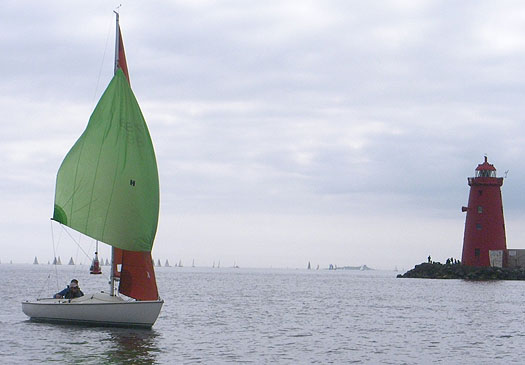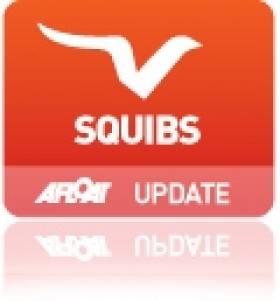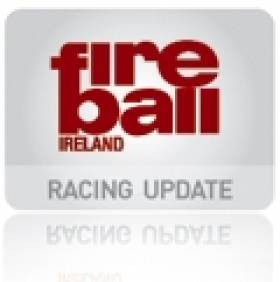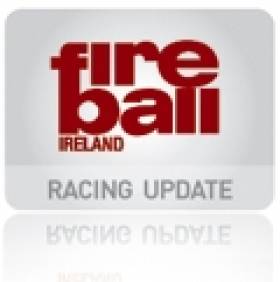Displaying items by tag: Clontarf Yacht & Boat Club
#squib – The key to a successful cruise is good organisation. Plan ahead, select your destination, ensure that the tide is going in a favourable direction, ensure that the facilities at your place of arrival are adequate for your group of cruisers, and that the weather is fine writes Vincent Delany.
A Squib class event was conceived on 12th June after club racing, to cruise on the following Saturday to Howth, on the opposite side of Dublin Bay, on the expectation of a fish and chip lunch at Beshoff's famous fish shop, followed by a leisurely pint at Howth Yacht Club.
All did not go to plan.
There was a high pressure system sitting over the east coast of Ireland on Saturday morning with about 1 knot of wind from the north. It took the seven squibs, (Jill, Conor and Dermot in Perfection, Vincent and Joe in Femme Fatale, Gerry and Elena in Buzz Lite, Sheila and Gilly in Little Demon, Rupert and Emily in Sidewinder, Fergal and Wendy in Aija and Derek and Jean in Why Not) at least an hour to sail from the Royal St George Yacht Club to the Dun Laoghaire Harbour mouth. At that rate of progress they were guaranteed not to have a favourable tide all the way to Howth Harbour. What should they do? It was agreed to raft up and put the thinking hats on! Then a small breeze from the north east appeared. Somebody suggested "Let's go to Clontarf.", the Squibs were pointed in the direction of Poolbeg where two venerable lighthouses mark the entrance to Dublin Port. En route we sailed through hundreds of large racing yachts looking for wind, and when they found it, trying to get it to stay in a constant direction to allow a Bloomsday race to start.
When the first Squibs reached Poolbeg lighthouses, they waited for the others to catch up, before entering the Dublin Port area where Clontarf is on the north shore. The tide was almost full in so there was plenty of depth, except in a few areas which were inevitably unmarked. As the Clontarf fleet were our racing, some moorings were lifted and some anchors dropped in the shallow water. Yes we did know that the moorings dry out at low water. Next question was, how do we get ashore? A launch appeared from nowhere, welcomed us to Clontarf, an asked us where we had come from, and enquired if we wanted to go ashore. Some headed straight to Beshoffs (yes there are two branches of Beshoffs, on in Howth and one in Clontarf.) while others went straight to the Yacht club for refreshment. Peter Reilly asked us if we would like to see the O'Brien Kennedy designed IDRA 14 footer which is currently being built at the back of the clubhouse by the members. She was progressing well with at least half the planking complete. When we came back to the front of the clubhouse the 15 hungry Squibs we consuming huge platters of sandwiches which had been quickly made by Mrs. O'Rourke. It turned out that Clontarf is celebrating the 100 year centenary of another invasion, from the Vikings, so the Squibs were invited to don some Viking helmets.

The Squibs make their way into Dublin Port
After about an hour of chat and gossip, it was time to check our boats in the falling tide. Yes they were all afloat with at least 300mm of water under the keels. An informal race was made out of the return trip, during which some Squibs were nearly run down by freighters entering Dublin Port. The light wind was from the south east, which meant that it was a beat all the way, but with a strong tide under us.
When only a few hundred yards from Dun Laoghaire harbour mouth, the wind disappeared entirely, so it was time to apply some paddle power.
In retrospect, spontaneity can be great fun. We should all spend more time cruising! .
#fireball – Here's a genuine offer to use a race-ready, competitive Fireball at an upcoming regatta on Dublin Bay. Applications are invited to sail a modern Wide Bow Winder Fireball, race ready and properly maintained in the upcoming Open and Classic Fireball Regatta at Clontarf Yacht & Boat Club over the weekend of 14/15th June 2014 - 2½ weeks away. This is a genuine opportunity to sample Fireball racing in a competitive boat which is insured for racing. Minimal conditions attached!
This is a bona-fide promotion of the Fireball Class due to the generous donation of the boat for the weekend by a high profile member of the Class.
The class is looking for;
a) A written submission setting out your dinghy sailing/racing experience.
b) Any evidence of Fireball sailing experience (not compulsory).
c) A combination of two people (helm and crew) who will sail the boat together, (No substitutions will be allowed.) on both days of the regatta – 6-race schedule.
d) Evidence of your interest in sailing/racing a Fireball.
You will be required to join the Fireball Class - €20 for both of you and pay the entry fee to the regatta.
Deadline for applications is 3pm, Tuesday 4th June 2014, so that a decision can be made after Tuesday night racing on the same evening. Applications should be directed to [email protected]
#pirate – A talk that begins in Thailand and ends in Turkey via Sri Lanka, India, the Indian Ocean, Oman, Yemen, the Red Sea, Eritrea, Sudan, Egypt, The Suez Canal and Cyprus will be given by Round the world sailors Pat and Olivia Murphy next Friday 28th Feb at 8pm in Dublin at the Clontarf Yacht & Boat Club.
The couple who spent five days sailing through pirate alley off Somalia in their round the world voyage have an extensive slide show as pert of their presentation.
Non-members & non sailors very welcome. Admission €5 (minimum) in aid of Lifeboat (RNLI)
Their experience during the passage includes;
• Forming a safety convey.
• An armed escort.
• An overheating engine.
• A freighting incident on the Red Sea.
• The Suez Canal (Prison).
• Disagreement with Suez officials.
• Avoiding mile long tuna fishing nets.
• An Indian wedding.
• Mr Fix it (everywhere).
• A cracked car sump.
• Boat problems.
• Superb anchorages.
• Negotiating Oil Rigs.
• Egyptian baksheesh.
Fireballs Gather in Clontarf for Season Finale
#fireball – 24 boats have gathered for the season closing Irish Fireball Leinsters at Clontarf this weekend.
With race management by the host clubs Ian Sargeant, three races were sailed in good conditions - two Olympics and a Windward/Leeward. As ever with the Fireballs, General Recalls were also the order of the day with none of the races getting away at the first attempt.
Barry McCartin and Conor Kinsella dominated the opening day with two race wins (1 & 3) to generate a 6pt cushion over Noel Butler & Stephen Oram who took the other win. They counted a 4 and a 5 to have a 2pt gap over Diane Kissane & Finnbarr Bradley in 3rd.
As there is a very limited time window in Clontarf the racing was restricted to three races.
1 Barry McCartin & Conor Kinsella 4pts
2 Noel Butler & Stephen Oram 10pts
3 Diane Kissane & Finnbarr Bradley 12pts
4 Simon McGrotty & Darach Dineen 13pts
5 Damien Bracken & Brian O'Hara 16pts.
































































